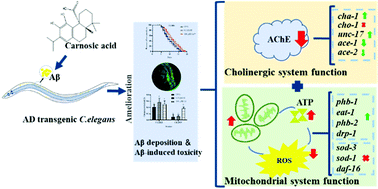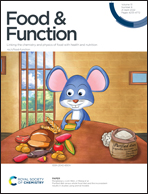Carnosic acid ameliorated Aβ-mediated (amyloid-β peptide) toxicity, cholinergic dysfunction and mitochondrial defect in Caenorhabditis elegans of Alzheimer's Model†
Abstract
Amyloid-β peptide (Aβ)-induced cholinergic system and mitochondrial dysfunction are major risk factors for Alzheimer's disease (AD). Our previous studies found that carnosic acid (CA), an important polyphenol antioxidant, could significantly delay Aβ1–42-mediated acute paralysis. However, many details and underlying mechanisms of CA's neuroprotection against Aβ-induced cholinergic system defects and mitochondrial dysfunction remain unclear. Herein, we deeply investigated the effects and the possible mechanisms of CA-mediated protection against Aβ toxicity in vivo through several AD Caenorhabditis elegans strains. The results showed CA delayed age-related paralysis and Aβ deposition, and significantly protected neurons from Aβ-induced toxicity. CA might downgrade the expression of ace-1 and ace-2 genes, and upregulate cha-1 and unc-17 genes to inhibit acetylcholinesterase activity and relieve Aβ-caused cholinergic system defects. Furthermore, CA might also ameliorate Aβ-induced mitochondrial imbalance and oxidative stress through up-regulating the expression of phb-1, phb-2, eat-3, and drp-1 genes. The enhancements of the cholinergic system and mitochondrial function might be the reasons for the amelioration of Aβ-mediated toxicity and Aβ aggregation mediated by CA. These findings have helped us to understand the CA anti-Aβ activity in C. elegans and the potential mechanism of action.



 Please wait while we load your content...
Please wait while we load your content...